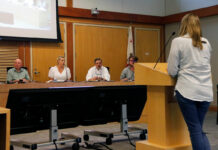Public perception of professional car washes during a time of drought has often led to a call for restrictions on their water use. However, professional car washes are usually the most environmentally friendly method of cleaning a car. During this current drought in California, all residents should be conserving at home, including when cleaning their car. Increasing the time between washings is the first step to saving water. When the car has to be washed, take it to a professional car wash to save water and prevent pollution.
Professional car washes not only save water, often using only half the amount of water that home washing uses, they are also required by law to properly dispose of their wastewater. Most car washes recycle their water by cleaning it and using it again. All commercial car washers are required to dispose of their dirty water properly, in the sanitary sewer. Wastewater in the sanitary sewer gets treated at a wastewater treatment plant, whereas homeowners who wash their car outside often let their soapy water run into the storm drain, which drains directly to our creeks without being cleaned. Soapy water is a source of pollution for our local creeks and causes harm to fish and other wildlife, even if the soap is biodegradable.
A professional car wash uses between 15 and 70 gallons per wash package, vs 150 gallons used at home when a hose is left running for 15 minutes.
There are three types of car washes: self-serve, conveyor, and in-bay automatic. Self-serve allows customers to wash their cars themselves. A wand dispenses water and cleaner at varying rates. Self-serve style car washes often use the least amount of water, about 12 gallons per wash. The conveyor style car wash pulls the car along a conveyor and the wands activate as the car advances. This type of car wash uses approximately 44 gallons per package. An in-bay automatic car wash is when the driver pulls into a bay and parks and the car wash wands circulate around the car. This type of car wash uses about 72 gallons per package. These numbers, as reported by the International Car Wash Association, are approximate only, but all are less than the amount of water used while washing your car at home.
All professional car washes save water and prevent water pollution compared to home car washes and now professional car washes have the opportunity to showcase their commitment to an even higher level of sustainability. In California, a Green Business certification is available to businesses that exercise a high level of water and energy conservation, waste reduction, and pollution prevention techniques. Using low-toxicity soaps, compact florescent light bulbs, paper products with recycled content, low flow sinks and toilets, and many other practices are guaranteed at Green Business certified car washes. For more information on the Sonoma County Green Business Program, visit www.sonomagreen.org. In Mendocino County, call the Recycling Hotline at 468-9704) for more information. All California certified Green Businesses can be found at www.greenbusinessca.org.
When it comes time to wash your car, make the environmentally smart choice and take it to a professional car wash.
This article was authored by Claire Nordlie of Sonoma County Water Agency, on behalf of the Russian River Watershed Association. RRWA (www.rrwatershed.org) is an association of local public agencies in the Russian River Watershed that have come together to coordinate regional programs for clean water, fisheries restoration, and watershed enhancement.








